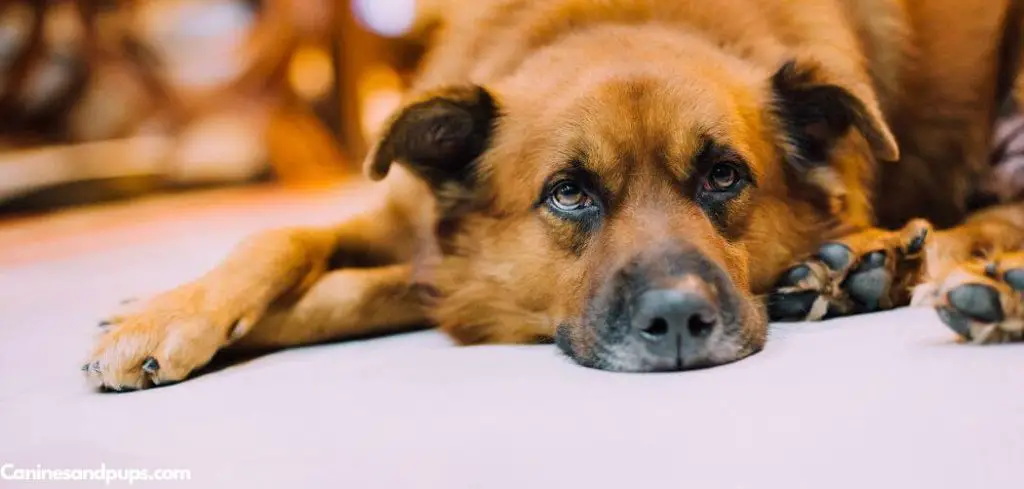Seeing your dog panting while scratching or biting at their skin during the night can be concerning.
Nighttime panting and itching may disrupt both your dog’s rest and yours, and can indicate underlying health issues beyond simple irritation. Understanding the possible causes helps you address the problem early and keep your dog comfortable.
We outline the common causes of panting and itching at night in dogs, what you can do at home, and when to seek veterinary help.
Table of Contents
Dog Panting and Itching at Night — Why It Happens
Dog panting and itching at night often happen due to allergies, parasites, or nighttime anxiety. Allergies to things like dust mites, fabrics, or indoor mold can worsen at night when your dog is resting in one place.
Fleas are also more active in warm environments, which can make nighttime itching worse. Also, dogs that feel stressed or overheated may pant more at night, especially in warm rooms or after an active day.

Dog Panting and Itching at Night: Common Causes
Allergies
Allergies are a common reason dogs itch and pant, particularly at night when environmental triggers accumulate.
Pollen, dust mites, mold, or flea saliva can irritate the skin and cause intense itching, often worsening in the calm, quiet of nighttime.
Panting may occur due to stress or discomfort from persistent scratching.
Look for redness, inflamed skin, paw licking, and hair loss. Chronic allergies can lead to thickened or discolored skin, making veterinary guidance important for long-term management.
Read more: Dog Panting and Itching Skin (Here’s why)
Flea or Parasite Infestations
Fleas, mites, and other parasites can make nighttime particularly uncomfortable for dogs.
Flea bites tend to itch most intensely in the evening, causing dogs to scratch or bite their skin and pant due to discomfort or anxiety.
Check for fleas, flea dirt, bald patches, or scabs. Untreated infestations can result in anemia, secondary infections, and significant discomfort, requiring prompt veterinary treatment.
Skin Infections (Bacterial or Fungal)
Skin infections often develop secondary to allergies, wounds, or excessive licking and scratching.
These infections can flare up at night, causing redness, oozing, or foul odor. Panting can occur as your dog reacts to pain or stress.
Proper diagnosis is critical, as bacterial or fungal infections usually need prescription medications for resolution.
Environmental Factors and Irritants
Nighttime itching may be exacerbated by dry air, bedding materials, or household chemicals.
Dogs with sensitive skin may react more at night, especially if bedding or blankets harbor dust mites or allergens. Panting can accompany the discomfort.
Signs include dry, flaky skin, redness, and increased licking or rubbing. Changing bedding, using gentle detergents, and maintaining optimal humidity can help, though persistent symptoms require veterinary evaluation.
Anxiety and Stress
Stress or anxiety can manifest more strongly at night, causing excessive panting and skin irritation.
Separation anxiety, fear of darkness, or nighttime noises may lead dogs to lick, bite, or scratch themselves compulsively.
Indicators include pacing, whining, restlessness, or clinginess. Addressing anxiety with environmental enrichment, calming routines, or veterinary-recommended interventions can reduce nighttime panting and itching.
Food Sensitivities
Dietary sensitivities can trigger itchy skin and discomfort that worsens at night. Common triggers include proteins like beef or chicken, grains, or dairy.
Panting may occur if your dog becomes uncomfortable or anxious due to the irritation.
Symptoms include chronic scratching, redness, hair loss, and digestive upset. Eliminating trigger foods under veterinary supervision can improve skin health and reduce nighttime irritation.
Hot Spots
Hot spots, or acute moist dermatitis, can develop rapidly and cause severe itching. These localized areas of inflamed skin are often more noticeable at night, when your dog is resting and becomes aware of the discomfort. Panting may accompany the pain and stress.
Hot spots are typically red, moist, and painful, and untreated lesions can worsen quickly. Veterinary attention is important to prevent infection and provide relief.
What to Do If Your Dog Is Panting and Itching at Night
Observing your dog closely is the first step. Note the times, locations, and severity of scratching or licking, and any potential triggers such as bedding, foods, or environmental changes.
Provide a calm sleeping environment with clean, hypoallergenic bedding and access to fresh water. Gentle grooming, regular flea control, and moisturizing shampoos for sensitive skin can help reduce irritation.
Avoid human medications or topical creams unless directed by a veterinarian, as some are toxic to dogs.
Dietary adjustments or supplements may benefit sensitive dogs, but always consult your veterinarian first. Persistent or worsening nighttime panting and itching should be evaluated professionally to determine the underlying cause.
When to Call or Visit Your Vet
Seek immediate veterinary attention if your dog shows:
Intense panting and severe, persistent itching
Open sores, bleeding, pus, or foul odor from the skin
Rapidly spreading irritation or hair loss
Signs of systemic illness such as vomiting, diarrhea, lethargy, or fever
Behavioral changes like anxiety, restlessness, or aggression
Early veterinary assessment ensures the underlying cause—whether allergies, parasites, infection, or systemic disease—is diagnosed and treated, preventing complications and improving your dog’s quality of life.
Read more: Dog Panting and Itching Ear (Here’s why)
Key Takeaway
Panting combined with nighttime itching may signal allergies, parasites, infections, food sensitivities, stress, or environmental irritants.
Monitoring your dog, maintaining a comfortable sleeping environment, and managing triggers are essential first steps.
Persistent or severe symptoms require veterinary evaluation to identify the root cause and provide appropriate treatment.
Timely intervention keeps your dog comfortable, prevents escalation of skin issues, and improves sleep quality for both your dog and your household.
